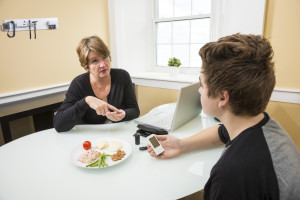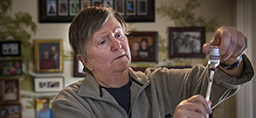
Depression among young people is all too common these days.
According to the Centers for Disease Control and Prevention, 7.6 percent of Americans ages 12 and older have been diagnosed with depression.
And among young people with Type 1 diabetes, depression is even more of a concern.
The gravity of living with an incurable, life-threatening disease that requires constant monitoring and management is a lot to handle for anyone, but is particularly overwhelming for young people.
“Diabetes is a chronic burden,” said Kristi Paguio, psychotherapist at the Spectrum Health Center for Diabetes & Endocrinology. “It can double the risk of depression.”
According to the American Diabetes Association, depression in people with Type 1 diabetes can cause them to poorly manage their health, which then can spiral into serious consequences such as severe hypoglycemia and diabetic ketoacidosis.
Paguio says that family and friends of young people with diabetes should be on the lookout for signs they are having difficulty coping.
“Those early adult years tend be stressful with college and other major life decisions,” she said. “Add living with Type 1 and everything is exponentially more complicated. Between 30 to 50 percent of our patients are struggling and need some level of support.”
“The life of someone with diabetes is a continually moving target, all focused on glycemic control,” she added. “When the glycemic index worsens, depression increases. The two co-exist.”
Paguio says that the Spectrum Health Center for Diabetes & Endocrinology has begun screening every patient for depression. A mental health counselor—Paguio—is located right in the center.
“Our providers check in with every patient on every visit,” she said. “They know how to guide the conversation to listen for indications of stress or that the patient is having a difficult time. They talk to them about it sometimes more from the stress perspective, rather than labeling it depression. If the provider is concerned, they encourage the patient to talk to a counselor.”
Paguio says cognitive behavior therapy can help patients cope with the emotional challenges they face related to their disease.
“The patients know that we understand the special challenges that come with diabetes,” Paguio said. “We work to help them make the physical and emotional changes to teach them to fight depression.”
If you know a young person living with diabetes, the American Diabetes Association encourages you to watch for signs of depression, including:
- Lack of interest in doing things they used to enjoy
- Change in sleep patterns—too much, too little
- Change in appetite
- Trouble concentrating
- Constant fatigue
- Nervousness
- Excessive guilt or worry
- Morning sadness
- Suicidal thoughts
 /a>
/a>
 /a>
/a>
 /a>
/a>